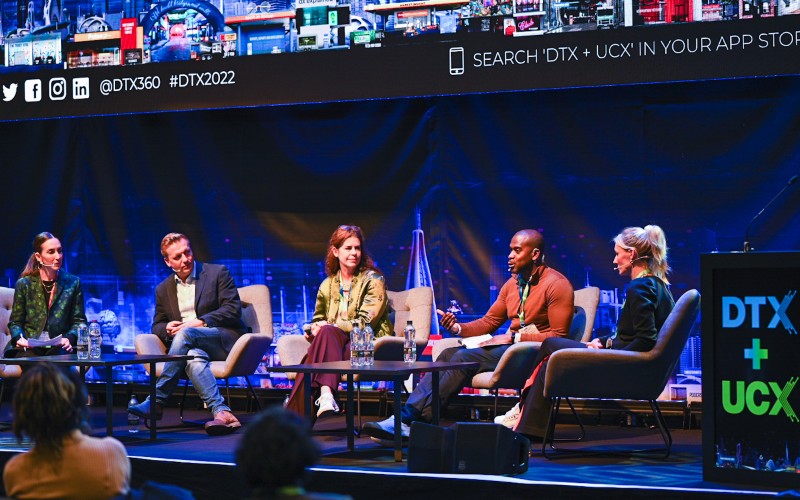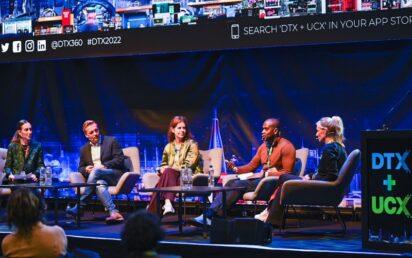Company culture was centre stage for technology leaders from LEGO, Rolls-Royce, IBM, Google and Three at DTX + UCX 2022 last week.
Digital transformers now understand that people will be the key to enable resilient infrastructure, re-design legacy approaches and reach innovation goals.
As Sven Strasburg, Principal Solution Architect for Sustainability Software at IBM noted: “Just because we don’t do something [yet] doesn’t mean we can’t.”
With COP27 fast approaching, sustainability was front of mind as companies considered how to reach big targets. On a Build Back Greener panel, PwC, IBM and techUK noted that while sustainable tech is a nirvana, there are clear steps to progress current operations.
Rachel Hampton, Sustainability Cloud & Digital Transformation Leader at PwC, believes bringing harmony to sustainable projects across the organisation is the way to build momentum and maximise results.
The power of small changes was seen in analysis by Amr Elwari, Sport Marketing Director at Oracle, where data innovation has increased race simulations by 25% for the Oracle Red Bull Racing team, helping Max Verstappen and Sergio Perez find millisecond improvements to take victory in Formula 1 races.
Finding the key insight within the noise came up for Lara Burns, Chief Digital Office at Scouts. Tasked to take a physical experience to digital across the UK, with limited funding, the team had to find ways to be creative with technology and reshape traditional narratives.
Eddie Copeland, CEO of London Office of Technology & Innovation, has been driving a human-centred approach to innovation, moving digital out of the tech bubble and into the hands of communities. He’s seen tech innovation ignite social change and emerge from unexpected places, summing up that despair is a collective failure of imagination.
Across the UCX stages, the task for many has been to reimagine ways of working and connect with customer needs. Malintha Fernando, Global Head of Digital Experience and Accessibility at HSBC shared inclusive technology considerations organisations can adopt to ensure people’s individual needs are recognised and accommodated.
Ellie Sutton, Proposition Lead at Waitrose, discussed how to empower local teams and support staff through upcoming challenges. A recent example being the gift of £500 to every partner in the company in light of the cost-of-living crisis.
On a Beach to Boardroom panel tackling the changing nature of the workplace, Oxford City Council and Zoom talked of the swinging pendulum that now exists between home working and the office. If companies are to navigate future change, building flexibility into operations will be key.
As Jon Arnold of J Arnold Associates confirmed: “There’s no handbook for digital workplaces. It’s all about experimentation: it’s about building the right culture over time. Business leaders need to ask themselves: what does a healthy workplace environment look like?”
James McGough, Managing Director of DTX + UCX 2022, believes that organisations are entering a critical phase: “So much was learned by organisations during the pandemic and we’re starting to see those changes embed themselves into company culture. For companies to maintain the much-needed progress on digital transformation, putting people at the heart of strategy and connecting with their values will be the way forward.”
Finding the right talent to carry these initiatives for years to come is also front of mind for many. Gori Yahaya, CEO at UpSkill Digital, reminded the audience that “businesses need to start aligning their digital roadmap with their talent roadmap.”
On a panel helping organisations stand out in the quest for talent, UpSkill Digital, Rolls Royce, Sage, TechReturners and WPP discussed the important of finding partners to access new talent, how to encourage non-traditional talent to engage with your company and how to build an environment where employees can thrive.
The future leaders of tomorrow awards also took place at the event, shining a spotlight on students from St Thomas the Apostle College in Peckham who took the stage to share ideas on how AI will have an impact on the future of work and society.
The winning students came up with an AI application to help local governments predict areas of gentrification, to mitigate the effects on local people priced out of their own communities.
Katie King, CEO of AI in business commented: “Our work aims to help organisations of all types prepare to excel in this future, and we feel that young people of today should be given the best possible preparation to do the same.”


